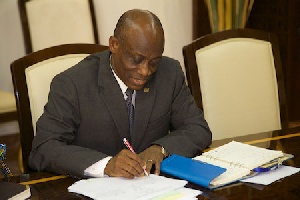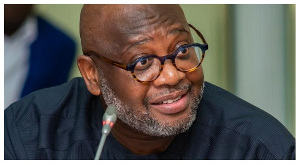Fiscal adjustment and deficit reduction strategies adopted by the Ghana's Finance Minister to reverse the economic challenges faced by Ghana has been hailed by the International Monetary Fund's Director of the African Department, Antoinette Sayeh.
“ Faced with a massive shock and with limited buffers, oil exporters will have no choice but to undertake fiscal adjustment. Spending cuts should be directed to the extent possible to non-priority recurrent spending,” Madam Sayeh told journalists during the ongoing Spring meeting of the IMF in Washington DC.
The Finance Minister has been criticized for sticking to his plan to consolidate fiscal expenditure in the heat of the rapidly reducing crude oil prices rather than other knee-jerk measures such as crude oil hedging.
“…we don’t think it [Ghana’s fiscal adjustment plan] is overly ambitious. It’s certainly a considerable fiscal adjustment. Ghana needs a considerable fiscal adjustment and needs to frontload that adjustment to deal with the very dire situation it’s been in over the course of the last 2 to 3 years as a result of very large fiscal and current account deficits that have really reduced growth, led to significant inflation, and undermined its ability to pay attention to the issues that Ghana needs to in the way of financing and making room for different spending needs to support sustainable growth in Ghana,” the IMF director told journalists, adding that Ghana was on the right path in its economic consolidation plans.
“I think there’s a consensus that the fiscal deficit issues need to be addressed and that consensus arose from a discussion that the government had a year ago with Ghanaian society by bringing different parties to the table to talk about the type of package that needed to be pursued. And very much a consensus that the deficit needed to be addressed and addressed in a way that minimized the risk of the program going off-track as Ghana approaches a new set of elections, which it will next year.”
In the face of dire economic challenges facing Ghana, Finance Minister Terkper, had initiated radical reforms aimed at cutting down budgetary deficits and waste in government expenditure while trying to reverse the downward spiral of major economic indicators. A major headache of the Mahama administration is the shortfalls in revenues due to the significantly reduced international crude oil prices.
Mr. Terkper in a recent statement said his plan to offset the shortfalls in oil revenues is to adjust the national budget to absorb the decline, rather than using hedging as the sole counter-measure.
“To address the revenue shortfalls noted above and ensure the achievement of the objectives of the ongoing fiscal consolidation, and keep borrowing in line with the levels approved in the 2015 Budget, key measures being implemented include an across the board reduction in expenditure ceilings on Goods and Services and Capital by Ghc344.0 million and Ghc868.4 million, respectively, as well as a drawdown of an amount of Ghc487.2 million from the Ghana Stabilization Fund.”
According to the Finance Ministry, the measures to address the impact of these shocks will yield the intended benefits and ‘significantly contribute to the achievement of our short-to-medium term fiscal consolidation objectives’.
The IMF which recently released over US$ 900 million to Ghana in a landmark bailout believes the economic prospects are bright for Ghana, “we think it’s entirely feasible for Ghana to achieve that fiscal adjustment, both in terms of reinforcing its revenue efforts, increasing revenues,” Ms. Sayeh stated.
General News of Tuesday, 21 April 2015
Source: The Republic

















